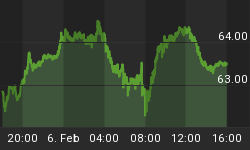Markets have been surprisingly quiet over the last few days. Some of that, no doubt, is due to the NCAA basketball tournament, to the Good Friday/Easter Monday holiday in the U.S. and in Europe, and to baseball's Opening Day.
We also had Japanese year-end and the end of Q1 in the U.S., and to the extent that the last week has brought any market moves of interest at least a portion of that can be put on the account of the calendar. On Thursday, the S&P set a record month-end close, although a higher intraday print was established in October of 2007. But while news accounts attributed the almost-record to an "easing of Cyprus fears," it is much more likely that it was due to the normal (and well-known) quarter-end "mark 'em up" machinations of less-scrupulous fund managers in illiquid market conditions.
In a similar vein, the quirk of having the quarter end on a Thursday three days before the calendar turns helped exaggerate a massive move in grains, especially corn, on a mildly bearish crop report. Those who are invested in commodities for tactical reasons are being flushed because they're tired of waiting, as an article in today's Wall Street Journal made clear. The investors who are leaving do not have comfort in the asset class because they don't understand the drivers of the asset class; the result is that they become performance chasers. So, when crop reports suggest that the real price of corn should fall a little bit, investors slash nominal prices 10% in 'get me out' orders.
But as I said, these investors don't understand the fundamental drivers of the asset class. The article cited above regarded the breakdown of the correlation between commodity indices and equity indices as something sinister, saying that the correlation is at its lowest level since 2008 and suggesting that this means that one of the two markets is wrong. As it turns out, though, the correlation of stocks and commodities is a relatively new phenomenon. Over the last 5 years, the correlation of monthly changes in the DJ-UBS index and the S&P is 0.61. However, for the 17 years prior to that, the correlation was 0.04 (see chart, source Bloomberg).
For the GSCI commodity index, the last-5-years correlation is 0.65, but for the 38 years prior to that (the GSCI has a longer history) the correlation was -0.02. In short, there is no reason to read a whole lot into the recent decoupling of stocks and commodities, except that it may suggest the hot money is finally leaving commodities. The correlation breakdown is also a good thing for anyone who believes - as I do - that stocks are overvalued. And, since a good portion of commodities' long-run return comes from a rebalancing effect that is larger when the inter-commodity correlations are lower, this is more good news.
The choppy melt-up in stocks on Thursday was partially reversed by the new-quarter blues today, but all of this is mere detail. Over the last week, while authorities in Europe have encouraged investors to put the Cyprus issue to bed additional details have emerged that deserve mentioning. For example, it turns out that the larger depositors (over €100,000) investors in one of the Cypriot banks will not get a 10% haircut, or a 20% haircut, but something close to a 100% haircut - 37.5% of the deposit balance in excess of 100k will be converted to equity in the bankrupt bank. There are some reports that certain deposits belonging to "EU funds" will be exempt from the haircut. There are of course the stories that capital controls implemented in Cyprus were ignored in non-Cyprus branches of Cypriot banks, and one Cypriot newspaper is claiming that relatives of the president withdrew substantial funds from Laiki bank just before the bank was shut down.
While the worst of the immediate crisis has surely passed, it seems madness to me to pretend that it never happened or that it will have no knock-on effects. For that matter, it seems madness to conclude that since the knock-on effects were not immediate, that no such effects exist. On the other hand, when events are no longer going bang-bang-bang in rapid succession, it is reasonable to ask "whose move is it?" Will bank deposits begin to flee from periphery countries, or wait to see what assurances European officials give? Are central bankers already injecting liquidity into shaky banks, or are they waiting for the invitation from the banks in-country? Are investors reducing risk and diversifying away from European assets, or are they waiting to see if other investors do so first? All of these actions entail costs, and so there is a natural desire of every party to delay action...but to not delay action so long as to cause those costs to rise substantially.
As a trader, my inclination is to hit a bid and get out, and not worry about the bid/offer spread or those other costs. But I am not dealing with billions of Euros when I do that. Still, the insight is that when bad things might happen, the here-and-now transactions costs are usually a poor reason not to seek protection. This is why T-Bills over the last couple of years have occasionally had negative nominal yields (see the chart of 3-month T-bill yields below, source Bloomberg). Yes, it's clearly dumb to pay $1.01 now to receive $1 in the future. But is it dumber than the alternatives?
You can follow me @inflation_guy!
Enduring Investments is a registered investment adviser that specializes in solving inflation-related problems. Fill out the contact form at http://www.EnduringInvestments.com/contact and we will send you our latest Quarterly Inflation Outlook. And if you make sure to put your physical mailing address in the "comment" section of the contact form, we will also send you a copy of Michael Ashton's book "Maestro, My Ass!"















